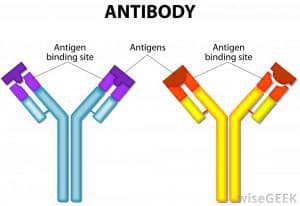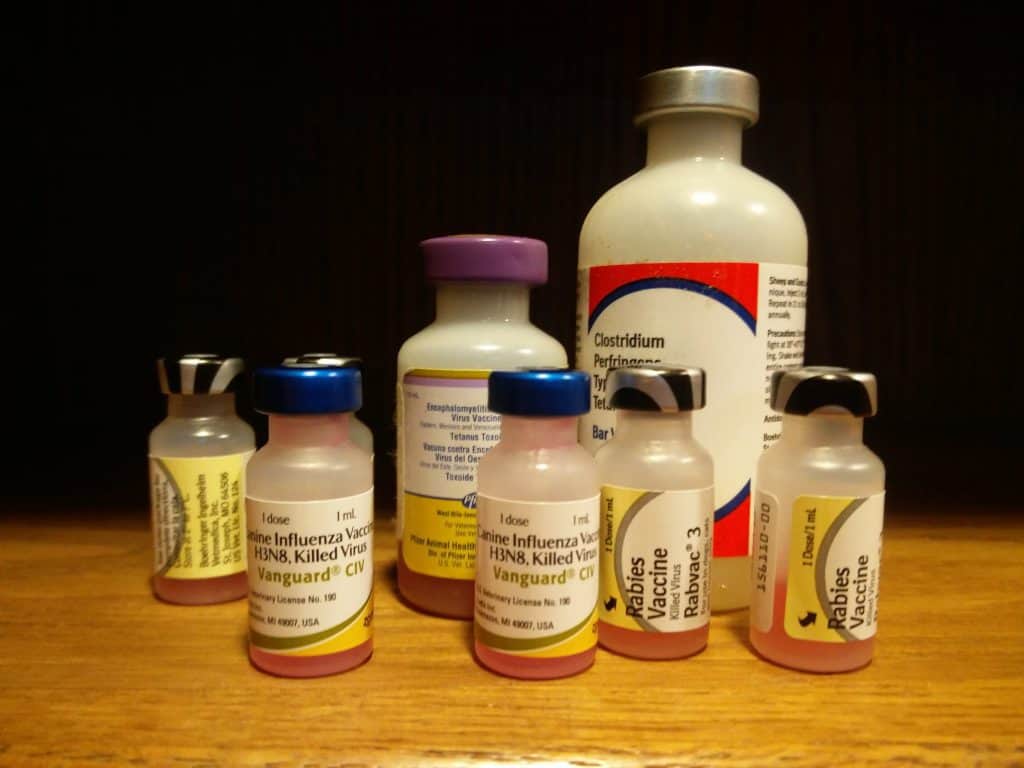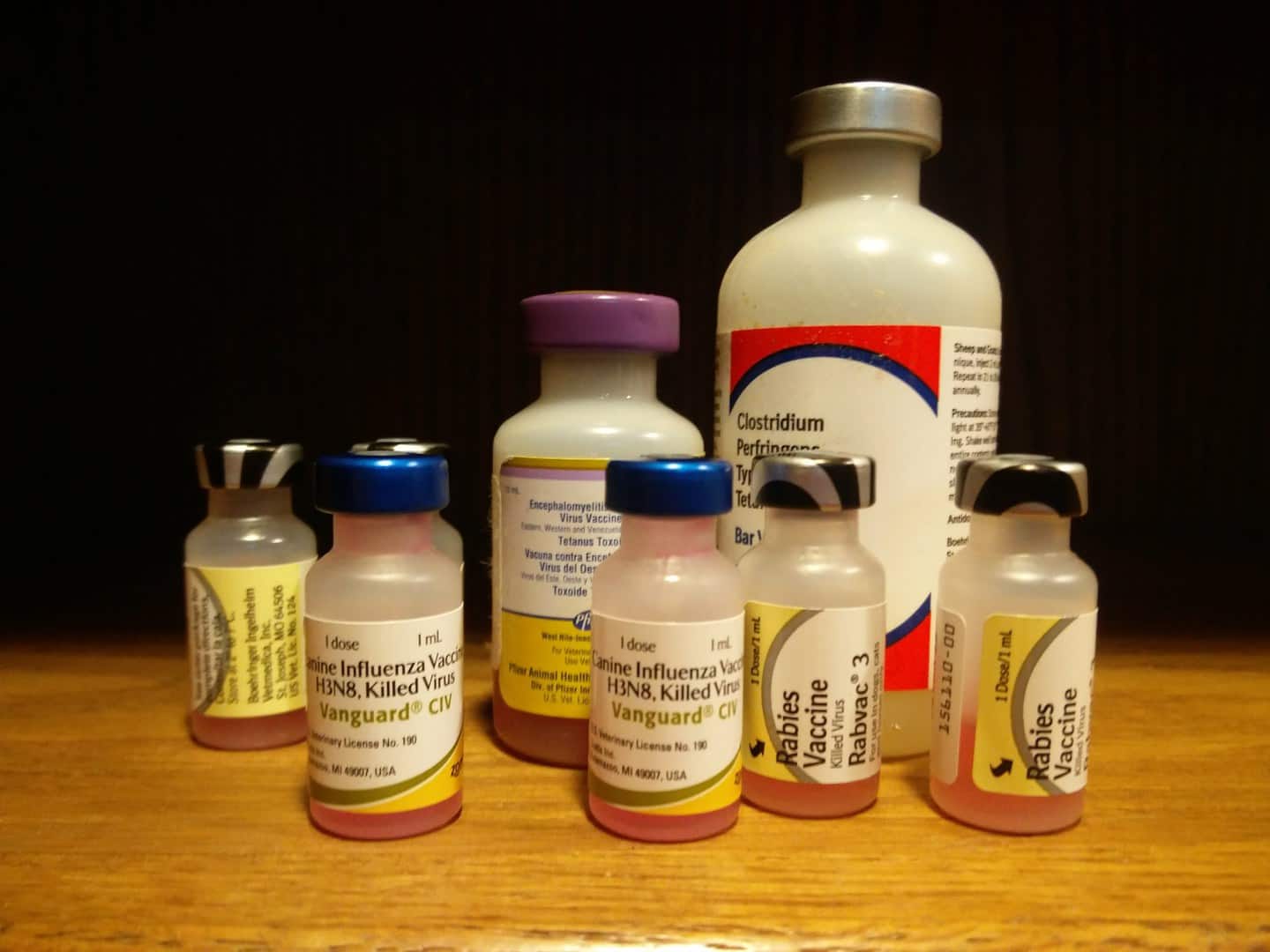Vaccination is a hot topic in the human medicine world. Some people are uneasy with or downright opposed to having themselves or their children vaccinated. In the veterinary medicine world, though, most pet owners get their animals vaccinated without a second thought. When it comes to pets, it can be daunting to comprehend which vaccines are needed, how often they are needed, and what diseases they prevent, so most owners accept whatever they are told in this regard. However, I think it is important to include the owner in this discussion. As an owner, you know your pet and its lifestyle best and can help tailor a vaccination plan that is specific to your animal.
In this series of blog posts, we will investigate vaccines as a whole and then delve closer into each of the diseases these vaccinations protect against to better help you understand why we vaccinate and how it can help your pet remain happy and healthy.
How do vaccines work?

In the simplest terms, vaccination is used to prevent contagious disease. The goal for animals is to improve the health of pets, improve production in livestock animals, and help attenuate the spread of disease to humans. Vaccines use antigens to help prepare your pet’s immune system to fight organisms, such as viruses, that cause disease. An antigen is a substance that induces an immune response in the body, specifically the production of antibodies. The antigens in a vaccine imitate the disease-causing organism, stimulating a mild response without actually causing illness or disease. The antibodies produced in response to a vaccine can then recognize and fight the real disease if the pet is ever exposed to it.
Recommendations: core vs. elective
With so many vaccines out there, how do you know which ones you should get for your pet? Vaccines are divided into “core” vaccines and “elective” vaccines. Core vaccines are recommended for every pet, regardless of lifestyle. A core vaccine is one that:
- Targets a serious and debilitating disease.
- Targets a disease that endangers most or all animals of a certain species regardless of lifestyle or environment.
- Has minimal associated risks and side effects.
- Is highly effective at preventing the targeted disease.
Elective vaccines don’t meet all the criteria above and therefore don’t make sense in all cases. Factors that should be considered include age, medical history, lifestyle, and environment. Weighing the pros vs cons of a certain elective vaccine for a pet is where input from owners can be very helpful. Later in this series, I’ll go over the range of canine and feline vaccines, both core and elective.

Types of vaccines
In the veterinary world, there are two different types of vaccine readily available: modified-live vaccines and killed vaccines. They each have their advantages and disadvantages. Newer technology has also added a third type called a recombinant vaccine that tries to address concerns that have arisen with the older types.
Modified-Live Vaccine
Modified-live vaccines contain viruses that are partially inactivated, but still viable and able to replicate. They are very similar to the disease causing organism, but unable to produce the disease. Because of the close similarity these vaccines have to the actual organism you are vaccinating against and the fact that the virus is alive and viable, you get a strong and well-directed immune response. The downside to these vaccinations it is sometimes possible for the modified organism to revert to an infectious state.
Killed Vaccine
Killed vaccines are completely inactivated and therefore incapable of infecting the animal. The downside to killed vaccines is that they don’t elicit as robust an immune response and are quickly eliminated from the animal’s body. Many killed vaccines also contain adjuvants that cause a local immune response, leading to more immune cells to come into contact with the antigens from the vaccine, improving its efficacy. Unfortunately, adjuvants can themselves sometimes cause problems and have been associated with tumor formation and allergies.
Recombinant Vaccine
DNA technology has advanced to where we can create vaccines without adjuvants and without the risk of reverting back to a disease causing state. For example, the DNA of a completely innocuous canary pox virus was modified to carry small bits of DNA for surface proteins from the canine distemper virus. The dog’s immune system recognizes these small surface proteins and produces antibodies without having been exposed to the actual distemper virus itself.
Risks Associated With Vaccines
Most pets respond well to vaccination, but there are still risks. Although most adverse effects are mild and short-lived, severe reactions can occur. Some of the mild effects you may see in your pets after vaccination include sleepiness, depression, loss of appetite, low fever, irritability, sneezing, and a sore spot where vaccinated. Sometimes a lump may form at the vaccination site. These lumps are usually a combination of immune cells and scar tissue. In cats, some vaccines have been associated with the development of a fibrosarcoma tumor at the injection site. These can arise anywhere from 3 months to 4 years after initial vaccination. These tumors are generally locally aggressive and need to be removed quickly and aggressively with wide margins.
Anaphylaxis is a severe, life threatening allergic reaction resulting in vomiting, diarrhea, shock, and collapse. Anaphylactic reactions usually happen within minutes of administration of the vaccine, but can occur up to 24 hours afterwards. Anaphylactic reactions are always an emergency and need to be treated by a veterinarian immediately. Immune mediated hemolytic anemia is another severe, life threatening consequence that can occur with vaccination. This is when the immune system targets and destroys the animal’s own red blood cells. Unfortunately, this is an expensive and difficult condition to treat and some animals may never recover.
Conclusion
Ultimately, vaccines are an extremely useful and proven way to prevent disease in your companion animals. Specific vaccines are recommended based on a number of factors including its efficacy, the disease it targets, and your pet’s lifestyle. Side effects can happen, but fortunately are rare. In the next article of this series, we will discuss rabies and why it is widely considered it to be the most important vaccine you can give your animal.


